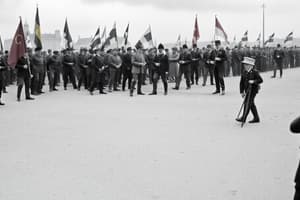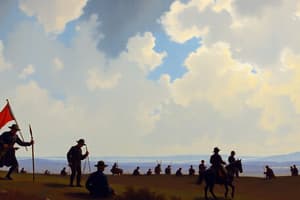Podcast
Questions and Answers
What nations formed the Triple Alliance?
What nations formed the Triple Alliance?
Germany, Italy, Austria-Hungary
What European nations formed the Triple Entente?
What European nations formed the Triple Entente?
Great Britain, France, Russia
What is 'militarism'?
What is 'militarism'?
A policy of aggressive military preparedness; glorification of the military
What caused a rise in tensions between European nations?
What caused a rise in tensions between European nations?
What event triggered the war in Europe?
What event triggered the war in Europe?
Who were the Allies and who were the Central Powers?
Who were the Allies and who were the Central Powers?
Why did many Americans support the British?
Why did many Americans support the British?
Which side did American businesses support?
Which side did American businesses support?
When and why did Germany announce they would sink any ship found near Britain's coast?
When and why did Germany announce they would sink any ship found near Britain's coast?
Why did a German U-boat sink the passenger ship Lusitania?
Why did a German U-boat sink the passenger ship Lusitania?
Why did Germany promise to stop sinking merchant ships without warning?
Why did Germany promise to stop sinking merchant ships without warning?
What events caused the United States to declare war?
What events caused the United States to declare war?
What was the War Industries Board?
What was the War Industries Board?
What did the Food Administration do?
What did the Food Administration do?
What did the Fuel Administration manage?
What did the Fuel Administration manage?
What ways did the United States pay for the war?
What ways did the United States pay for the war?
What was the Selective Service?
What was the Selective Service?
Were all U.S. soldiers drafted during World War I?
Were all U.S. soldiers drafted during World War I?
How did many African American soldiers serve in World War I?
How did many African American soldiers serve in World War I?
In what roles did women serve during the war?
In what roles did women serve during the war?
How did Mexican Americans contribute to World War I?
How did Mexican Americans contribute to World War I?
What was one main idea regarding weapons during World War I?
What was one main idea regarding weapons during World War I?
In 1914, warfare changed with the use of what?
In 1914, warfare changed with the use of what?
To protect themselves from artillery fire, the troops did what?
To protect themselves from artillery fire, the troops did what?
What methods did the Germans and the British use to break through enemy lines?
What methods did the Germans and the British use to break through enemy lines?
What new technologies were used in combat during WWI?
What new technologies were used in combat during WWI?
What was a sentiment among many Germans when Americans entered WWI?
What was a sentiment among many Germans when Americans entered WWI?
What was the effect of using convoys at sea during WWI?
What was the effect of using convoys at sea during WWI?
Flashcards are hidden until you start studying
Study Notes
Triple Alliance and Triple Entente
- The Triple Alliance consisted of Germany, Italy, and Austria-Hungary.
- Great Britain, France, and Russia formed the Triple Entente.
Militarism and Tensions
- Militarism emphasizes aggressive military preparedness and glorifies military might.
- Key factors raising tensions in Europe included imperialism, nationalistic sentiments, shifting borders, and pre-existing alliances summarized by the acronym MAIN.
Triggering Events
- The assassination of Archduke Franz Ferdinand in Sarajevo in 1914 triggered the onset of World War I.
Allies and Central Powers
- The Allies were comprised of the Triple Entente nations: Great Britain, France, and Russia.
- The Central Powers included the remnants of the Triple Alliance (Germany and Austria-Hungary) alongside the Ottoman Empire and Bulgaria.
American Support
- Many Americans supported the British due to shared cultural ties and the influence of British propaganda.
- American businesses had strong connections to the Allies, with many banks investing in an Allied victory.
Germany's Naval Policies
- In 1915, Germany announced a policy to sink any ships found near Britain's coast due to British blockades affecting German ports.
- The German U-boat sank the Lusitania, as it was located in British coastal waters, which were designated as a war zone.
U.S. Entry into the War
- Germany promised to halt the indiscriminate sinking of merchant ships to avoid provoking U.S. entry into the conflict.
- The Zimmermann Telegram prompted the United States to declare war, where Germany suggested Mexico regain lost territories in exchange for their alliance.
War Mobilization Efforts
- The War Industries Board coordinated the production of war materials and was the most significant agency formed by Congress.
- The Food Administration aimed to increase domestic food production, led by Herbert Hoover.
- The Fuel Administration managed coal and oil resources during the war.
Financing the War
- The U.S. funded the war effort through increased income tax rates and the sale of Liberty and Victory Bonds.
Labor during the War
- Industries sought labor from women, African-Americans, and Mexicans to fill workforce gaps.
Limitations on Liberties
- The Espionage Act of 1917 and the Sedition Act of 1918 were laws that restricted citizens' liberties.
Draft and Service Composition
- Selective Service established a system to draft men into military service.
- About two million U.S. soldiers volunteered for service rather than being drafted.
Diversity in the Military
- African American soldiers served in racially segregated units but demonstrated valor.
- Women participated in noncombat roles, including clerical and medical tasks in the armed forces.
- Mexican Americans volunteered for service in greater numbers than any other minority group during the war.
Impact of Warfare Technology
- The war introduced powerful artillery that devastated landscapes and resulted in millions of deaths.
- Troops dug trenches for protection against artillery fire.
- Germans utilized poison gas, while British forces deployed armored tanks to breach enemy lines.
- World War I was notable for the first use of airplanes and zeppelins in combat.
American Influence on War Morale
- Upon U.S. entry into WWI, many Germans believed their chances of winning were diminished.
- The implementation of convoy systems significantly reduced shipping losses and protected lives at sea.
Studying That Suits You
Use AI to generate personalized quizzes and flashcards to suit your learning preferences.




